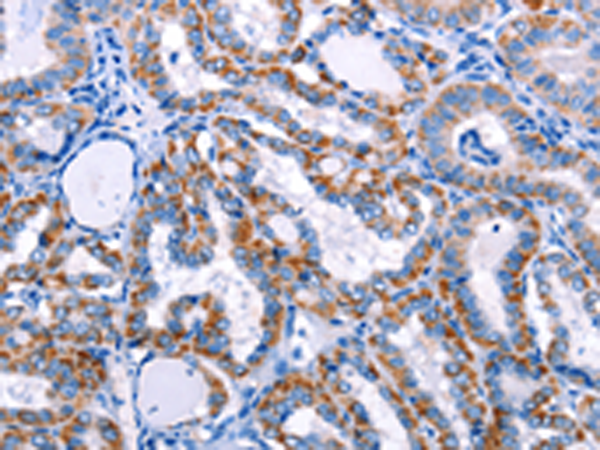

| WB | 1/200-1/1000 | Human,Mouse,Rat |
| IF | 咨询技术 | Human,Mouse,Rat |
| IHC | 1/25-1/100 | Human,Mouse,Rat |
| ICC | 技术咨询 | Human,Mouse,Rat |
| FCM | 咨询技术 | Human,Mouse,Rat |
| Elisa | 1/1000-1/5000 | Human,Mouse,Rat |
| Aliases | FRA3B, AP3Aase |
| WB Predicted band size | 17 kDa |
| Host/Isotype | Rabbit IgG |
| Antibody Type | Primary antibody |
| Storage | Store at 4°C short term. Aliquot and store at -20°C long term. Avoid freeze/thaw cycles. |
| Species Reactivity | Human, Mouse, Rat |
| Immunogen | Fusion protein of human FHIT |
| Formulation | Purified antibody in PBS with 0.05% sodium azide and 50% glycerol. |
+ +
以下是3-4条关于FHIT抗体的参考文献及其摘要概括:
1. **"The FHIT gene, spanning the chromosome 3p14.2 fragile site and renal carcinoma-associated t(3;8) breakpoint, is abnormal in gastrointestinal carcinomas"**
- **作者**: Huebner K, et al.
- **摘要**: 该研究首次报道了FHIT基因在多种胃肠道癌症(如食管癌、胃癌)中的异常表达,并通过FHIT抗体进行免疫组化检测,发现FHIT蛋白表达缺失与肿瘤发生密切相关,提示其作为抑癌基因的功能。
2. **"Altered expression of Fhit in carcinoma and precarcinomatous lesions of the lung"**
- **作者**: Sozzi G, et al.
- **摘要**: 研究利用FHIT抗体分析肺癌及癌前病变组织,发现FHIT蛋白表达在早期肺癌中显著降低或缺失,且与吸烟相关基因损伤有关,支持FHIT作为肺癌早期诊断的生物标志物。
3. **"FHIT gene alterations in gastric adenocarcinoma"**
- **作者**: Baffa R, et al.
- **摘要**: 通过FHIT抗体检测胃癌组织中FHIT蛋白的表达,发现超过60%的病例存在FHIT表达缺失,且与肿瘤分期和预后不良相关,强调了FHIT在胃癌发生中的关键作用。
4. **"Fhit deficiency promotes hepatocellular carcinoma development under chronic inflammation"**
- **作者**: Huang Y, et al.
- **摘要**: 研究使用FHIT抗体分析肝癌样本,发现FHIT蛋白缺失在慢性肝炎背景的肝癌中尤为显著,表明炎症微环境下FHIT功能丧失可能加速肝癌进展,为靶向治疗提供理论依据。
以上研究均通过FHIT抗体揭示了该蛋白在不同癌症中的表达异常及其临床意义。
The FHIT (fragile histidine triad) antibody is a crucial tool in studying the FHIT protein, encoded by the *FHIT* gene located on chromosome 3p14.2. This region is frequently altered in various cancers due to deletions, hypermethylation, or transcriptional silencing. The FHIT protein, a member of the histidine triad (HIT) family, is implicated in tumor suppression by regulating cell cycle progression, apoptosis, and genome stability. Its loss or reduced expression is linked to the pathogenesis of numerous cancers, including lung, breast, gastric, and cervical cancers.
FHIT antibodies are widely used in research to detect FHIT protein levels in tissues or cell lines via techniques like immunohistochemistry (IHC), Western blotting, or immunofluorescence. These studies aim to correlate FHIT expression with clinical outcomes, tumor progression, or therapeutic responses. Commercially available FHIT antibodies are typically raised against specific epitopes, such as recombinant protein fragments or synthetic peptides, and validated for specificity across human and model organisms.
Research utilizing FHIT antibodies has provided insights into its tumor-suppressive mechanisms, including interactions with stress granules, DNA repair pathways, and metabolic enzymes. Additionally, FHIT restoration strategies, such as gene therapy or demethylating agents, are being explored as potential cancer treatments. Despite challenges in standardizing antibody performance across assays, FHIT remains a biomarker of interest for early cancer detection and prognosis.
×